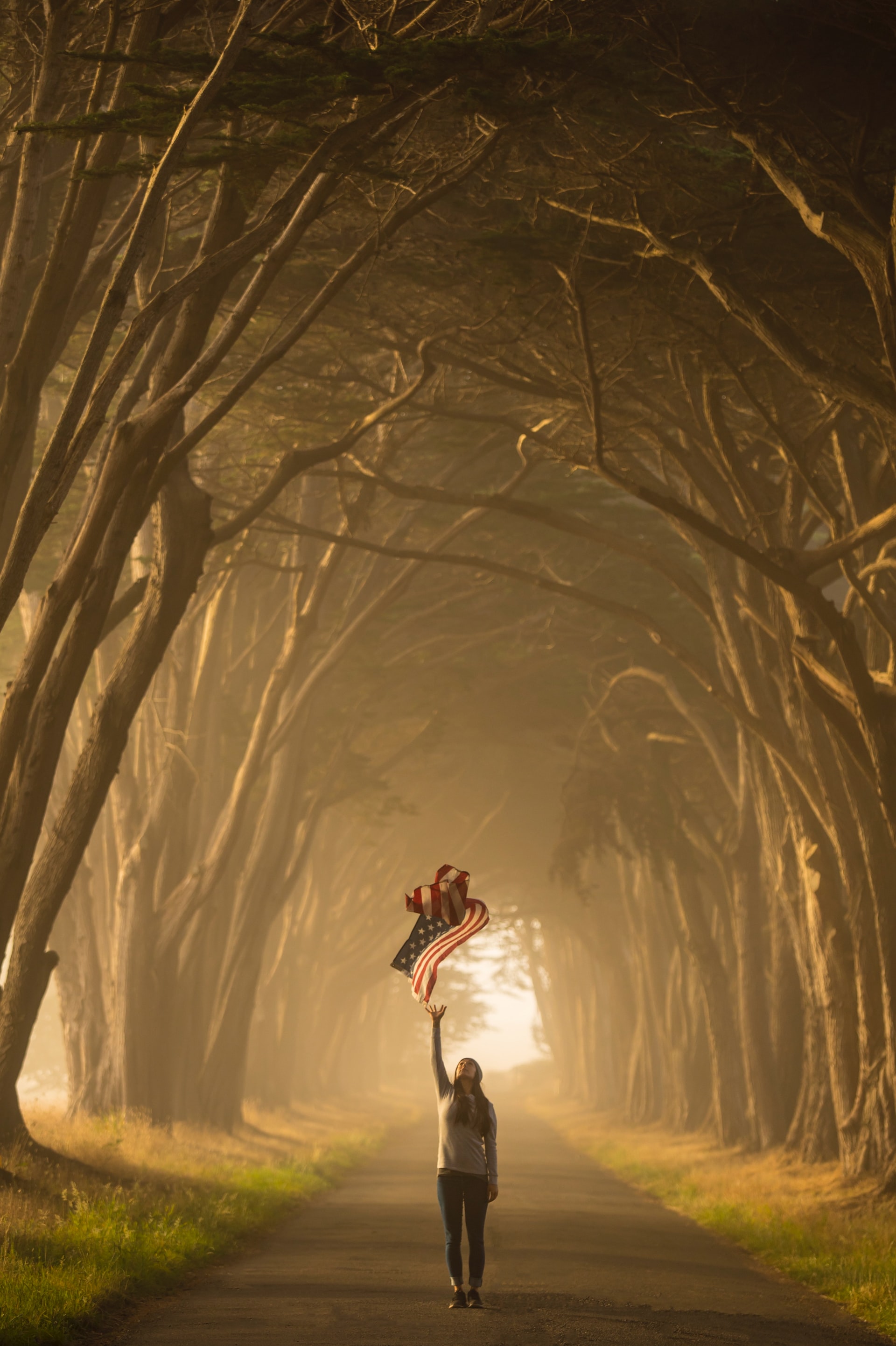To turn from hate to love there’s just one step; the road from hate to acceptance, however, is much longer.
We all carry burdens that have been dragged through generations; you didn’t ask for them, you were just born with them. You feel them and most of the time you suffer them.
I can feel every charge of slander and heartache; feel the weight of every responsibility, every punch, every pain, and every fragment of hate. They are all a part of me—some of them have expressed themselves through my body: chipped nails, ripped skin, OCDs, insomnia, headaches, and stomachaches.
When I was a kid and had to meet with my dad’s family for Sunday lunches, I’d exhale, totally resigned. But when the time arrived to study English: the time to listen to thousands of actors with American accents, British accents, unintelligible Scottish and Irish accents, to listen to each word coming out of their mouths so smoothly, each word like listening to a sweet symphony; I would sigh with craving.
I’ve lost count of all the books I read that took place in different parts of the United States and the United Kingdom—I wanted that life.
I wanted to act. I wanted English to be part of my life, to be the thing that surrounded me. When I got the chance to live in one of those places I loved so much, despite coming from a Latinx country, I had never been happier.
Despite that though, I was positively sure: I was not welcome.
I can’t say that all people in a big city hate me; it’d be too egotistical. But, I can assure you that they were all taught to hate me, to hate us. Not all of them do, but that doesn’t mean they care either.
Truly helping a foreigner doesn’t mean you put a sign in your front yard that says, “Welcome.”—that’s not enough. I’ve seen true neglect: I saw it when an immigration officer threw my passport in my face after stamping it; I saw it when one of my bosses called me a FOB, while looking at me with disdain, belittling me with his eyes.
I saw it while taking an elevator chock-full of people ready to get to work; most of them were born with some melanin in their skin, except for me and one other white guy. Beyond the color difference, which shouldn’t mean anything nowadays yet still does, we were all there to clean, to cook, to serve; so our bosses could receive all the tips and gratefulness from the customers.
There’s a myth, or fear, or assumption among those who migrate to a foreign country: it’s horrible. But it’s even worse when you see what they are thinking with your own eyes: you are not from here, so you are nothing.
Are you white? Okay, maybe you’ll get an interview.
Are you from Argentina? Well then, is your country smelly, are there pirates in it? Later they’ll ask me to leave their office, looking at me as if I have some sort of mortal disease that’s contracted just by sight.
Do you speak Spanish or Latin? They’ll smile at you because you’re blonde and white, but if they see you talking to the clerk at the cash machine, who’s wearing a hijab, they’ll insult you till their lungs burn out.
We all dream about changing the world at some point in our lives; the first time I set foot on American ground, I thought that I could make it.
But, being there I realized something: no matter how many times I escaped—moved from state to state, job to job, meet person after person—nothing was ever going to save me from the daily reminder: I am less.
Racism is part of all societies in this world, and in particular, it is part of the social and economical caste system that made the United States what it is today: the most powerful country in the world.
It’s lame of me to still want to go back, maybe I am masochistic, but really it’s because of that feeling of freedom, of individuality, of losing the burden that I dragged day and night from my family, religion, and government: the three big crosses of my country. There, I was free.
Now why would I return to my country, Argentina? For many reasons: I can say that it’s more comfortable, because I can live with my parents, and have my own room—that answer is so pathetic, it lacks blood and passion, it lacks truth.
The word change has been used a lot in my country lately, which is odd, because every day of my life, I see a bunch of different people who are just fighting for things to remain the same.
In the case of my country, I never saw a possibility to change it, not even the tiniest part, probably because because I was born and raised and I am still living here.
I know this place, this society, this country. I know how rotten it is at the core, and a flower can’t bloom. The problem with my country is that nobody wants to rip it out and sow something new. Because what’s new is unknown, so it’s attacked, cursed, denied, and forbidden.
It’s believed that the past is the truth—let’s stick to our great-grandparents’ ideals: we are all equal but you can be judged if you have sex with someone of the same sex as you; we can judge any woman who has had an abortion; we are all free but you have to do what the government, the leaders want, otherwise you’re not free at all. You are only free when you do what they say.
Freedom, liberty, and liberalism are beautiful concepts that different political parties have taken and ruined, their true essence tainted.
I have the freedom to make my own choices and take responsibility for their consequences; at the same time I let other people make their own choices, even though my moral parameter might be different.
I respect the choices other people make, the ideas they have, and how they think. I have ideas, but they change with time and they don’t rule me. I am the only one in charge of my life, and sometimes I don’t do it right, but I learn from my mistakes.
In Argentina, the government, church, Mummy, or Daddy never make a mistake. But if you never make a mistake, then you can’t grow, right? That’s the cause of Argentinean decay.
I can’t count the times I’ve cried, screamed, and banged the walls out of the hate this society has made me feel just living here—being a part of it, being born into it—to know that I will always belong to it. I tried to fight it, but something I learned in the U.S. is that we can’t escape from an infinite labyrinth; societies are built a certain way, but I am not the society. I am an individual, a person, the smallest minority, and that’s why I have to heal myself before anyone else.
I breathe. I stay. I talk. Baby step by baby step, I heal. Do I love things about this city? Yes. If I ever have children, would I like for them to see it? No. If I leave would I return to visit it? No.
I haven’t arrived at a state of acceptance yet. But I did reach a state where I have realized my city is more than ditches, ugliness, thievery, blood, strikes, and threats.
My city also encompasses the long walks I took with my grandpa when I was a kid; it’s the meatballs he cooked for me every Friday afternoon; it’s dancing with my green-eyed friend at the porch of my cousin’s house; it’s going to the movies with my cousin and favorite person in the world; it’s talking about music with my friend while he is holding his guitar; it’s drinking with my friend who loves K-pop; it’s every runaway trip to the beach; it’s every ride on the bus sitting in my mother’s lap. Now I take the same bus by myself, with a backpack full of reading material for the career I’m studying: a career I love, a career that I can study without having an endless debt for the rest of my life. It’s every New Year’s Eve celebration; it’s each present, each hug, each kiss, each touch, and each song.
There’s more than hate and violence in my life. There’s love.
Oppression, violence, distrust, and paranoia haunt us all, no matter where we are. We need to learn to let go of it: the bad but also the good, because sometimes we hold on to it too much, for too long, and we end up turning it into something worse.
We can’t allow the name of a president to bring gloom to our daily life. We can’t drown in the guilt other people throw at us. We have to let ourselves try, let ourselves study, let ourselves be, and let ourselves cry. Let go of the bad. Let go of the good.
The near 30 people I met in America don’t love me. A lot of people in Argentina do. I love them back, and I love the ones in America who don’t. The United States doesn’t hate me and Argentina doesn’t love me.
I love the U.S. for what it is, and I hate it because I can’t be part of it.
I love Argentina because of their sights, but I hate its society.
I accept Argentina is part of my life. I accept I am not Argentina.
I am Isaías: another guy in the bunch, a dumb blonde who was always blonde but was never dumb, who studies a career nobody knows anything about, another guy who wants something so much, but needs something else.
Sometimes I am a coward, sometimes I am brave.
Sometimes I lie, sometimes I’m nice.
Sometimes I’m smart, sometimes I’m not; sometimes I am lonely.
But I am always Isaías.
I’m not much, but I am all I have. It is enough, for now. That’s the problem, and that’s the solution.
I am Isaías. And I am letting go; letting go of the U.S. and Argentina. They are countries that don’t have a limited life-span, but I do.
I am Isaías, and I am holding on to myself today.
~


 Share on bsky
Share on bsky





Read 4 comments and reply